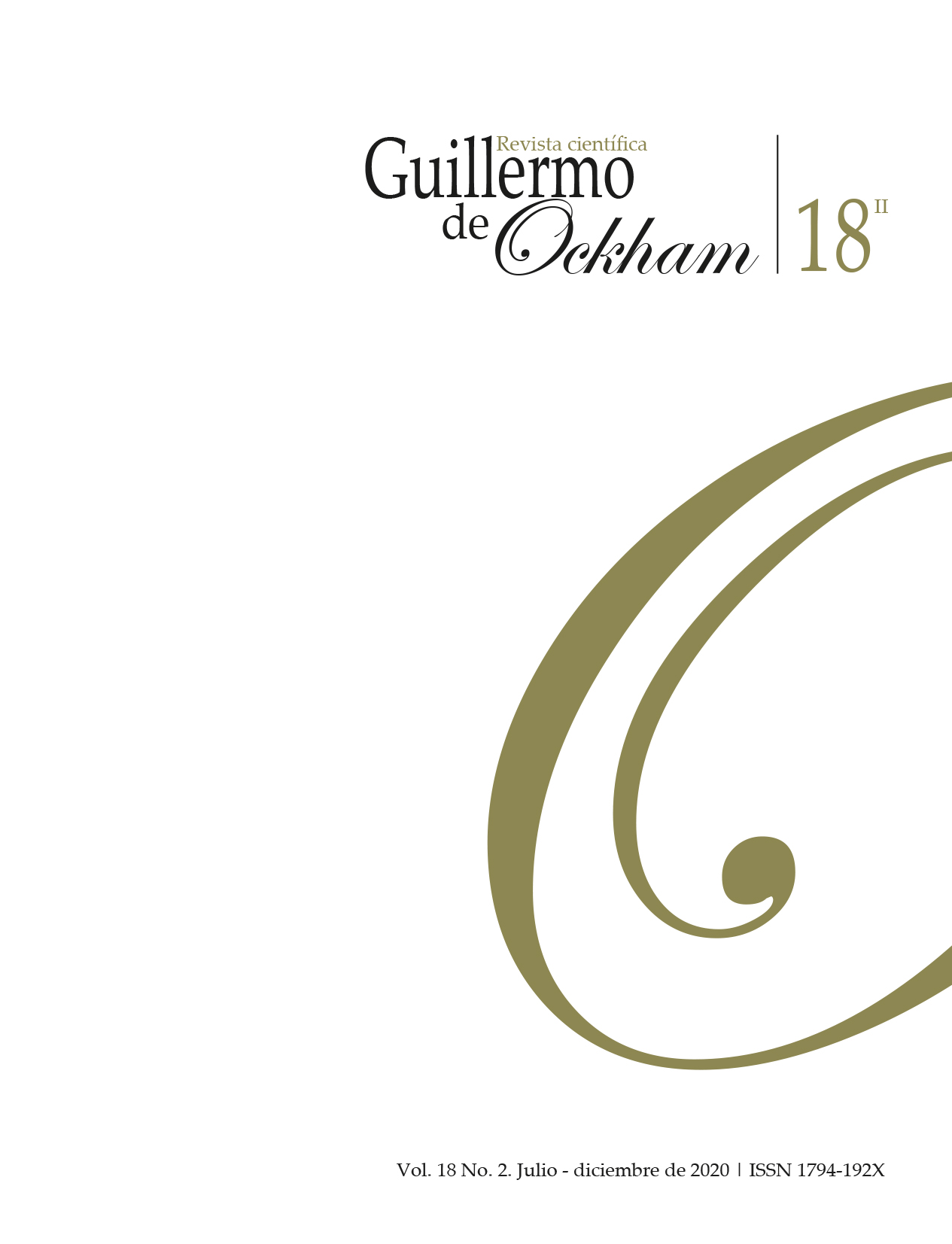The Revista Guillermo de Ockham provides an immediate and open access to its content, based on the principle of offering the public a free access to investigations to provide a global interchange of knowledge.
Unless otherwise established, the contents of this journal has a license with Creative Commons Attribution-NonCommercial-NoDerivatives 4.0 International (CC BY-NC-ND 4.0) http://creativecommons.org/licenses/by-nc-nd/4.0/
- Attribution: You must give appropriate credit, provide a link to the license, and indicate if changes were made. You may do so in any reasonable manner, but not in any way that suggests the licensor endorses you or your use.
- NonCommercial: You may not use the material for commercial purposes.
- NoDerivatives: If you remix, transform, or build upon the material, you may not distribute the modified material.
- No additional restrictions: You may not apply legal terms or technological measures that legally restrict others from doing anything the license permits.
Abstract
The concept of Being is found in the first questions posed by Greek thinkers, explicitly there are questions such as what is being? Who is the being? What is the sense of being? What is the thing itself? In an attempt to answer these questions, two philosophical traditions were opened: on the side of Parmenides, one that opted for the permanence of being; and on the side of Heraclitus, one that includes being in a constant advent; in the same way, transformations have been generated in which the being is understood either as essence or as existence. However, from these positions, as well as subsequent explanations, an understanding of the being that centers the discussion on the being itself is seen, isolated from an analysis articulated with history and social affairs. However, stemming from Critical Theory and in discussion with psychoanalysis, a possibility is found of understanding the Being in articulation with history, social affairs and subjectivity in such a way that, on the one hand, the emotions around this philosophical problem par excellence were revived, and on the other hand, to investigate the essence of the human being in a historical moment crossed by a neoliberal policy and a consumerist economy in which both the subject and the being are obliterated. It is finally found that in properly human dimensions such as work and language, it is possible to follow a path that allows us to understand the Being in relation to the subjectivity and the dynamics of the current era.
References
Benjamin, W. (2001). Sobre el lenguaje en general y sobre el lenguaje de los humanos. En W. Benjamin (Ed.), Para una crítica de la violencia y otros ensayos. Iluminaciones IV (pp. 59-74). Madrid: Taurus.
Beuchot, M. (2008). La hermenéutica y las nuevas ontologías. En-claves del pensamiento, 2(4), 77-89.
Engels, F. (1997). El papel del trabajo en la transformación del mono en hombre. Bogotá D.C.: Panamericana.
Autor, C. (2018). El problema de lo humano y su lazo social: un abordaje desde la inquietud de sí. En C. Autor, N. Porras & D. Parada (Eds.), El problema de lo humano y su lazo social (Reflexión y práctica) (pp. 19-52). Bogotá: Fundación Universitaria Los Libertadores.
Autor, C. (2016). Trabajo, inclusión laboral y utilidad en el plano óntico del sujeto. En J. Bäez, N.R. Porras, C. Autor, A.M. González, J. Gallo & Roa, H.C. (Eds.), Salud mental y el sistema de producción (pp. 109-140). Bogotá: Fundación Universitaria Los Libertadores.
Ferrater, M. (1964). Diccionario de filosofía. Buenos Aires: Montecasino.
Freud, S. (1992). El malestar en la cultura. En S. Freud (Ed.), Volumen 21 (1927-31) El porvenir de una ilusión El malestar en la cultura y otras obras (pp. 57-140). Buenos Aires: Amorrortu.
Heidegger, M. (2010). El ser y el tiempo. México: Fondo de Cultura Económica.
Hesíodo. (1986). Teogonía trabajos y días. Madrid: Alianza Editorial.
Higuera, E.F. (2016). Metafísica sin ontología. Franciscanum. Revista de las ciencias del espíritu, 58(165), 145-173.
Marcuse, H. (2016). Nuevas fuentes para la fundamentación del materialismo histórico (1932). En H. Marcuse (Ed.), Sobre Marx y Heidegger. Escritos filosóficos (1932-1933) (pp. 65-122). Madrid: Biblioteca Nueva.
Mosès, S. (1997). Las metáforas de los orígenes: ideas, nombres, estrellas. En S. Mosès (Ed.), El ángel de la historia. Rosenzweig, Benjamin, Scholem. (pp. 81-102). Madrid: Cátedra.
Smith, A. (2007). La riqueza de las naciones. Madrid: Alianza Editorial
Ordóñez, E.J. (2014). Rasgos de la ontología fundamental. Revista Guillermo de Ockham, 19(1), 95-102.
Vélez, P. (2015). ¿Ontología u Ontologías?. Disputatio. Philosophical Research Bulletin, 4(5), 299-339.
































